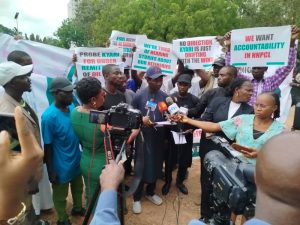
Abuja, Nigeria — On Monday, a large group of demonstrators took to the streets of Abuja, demanding the immediate resignation of Mele Kyari, the Group Managing Director of the Nigerian National Petroleum Corporation Limited (NNPCL), amid ongoing fuel shortages plaguing the country.
The protests were sparked by NNPCL’s recent admission that a significant debt to suppliers is jeopardizing the sustainable supply of fuel. The corporation noted that this financial strain is severely impacting its operations and threatening the stability of fuel availability across Nigeria. rights lawyer Femi Falana voiced his concerns regarding the rising cost of living, arbitrary increases in petrol prices, and the resulting scarcity, which he stated has led to fewer vehicles on the roads. Speaking on Channels Television’s Politics Today, Falana emphasized the urgent need to expose the “monumental fraud” surrounding fuel importation in Nigeria.
As protesters chanted solidarity songs and displayed banners with messages such as “We are tired of fuel scarcity” and “No direction under Kyari,” they expressed frustration over what they described as a dismal performance during Kyari’s tenure.
Aminu Abbas, Convener of the Coalition of Concerned Civil Society Organizations, addressed the crowd at Unity Fountain, questioning why a country rich in oil continues to experience acute petrol shortages. “To President Bola Ahmed Tinubu and all those in power, we say the time to act is now. Show us that you stand with the people, not those who profit from our misery,” Abbas declared. He called for reform within the NNPCL to ensure it serves the interests of all Nigerians.
“The fuel scarcity we endure today is not just a mere inconvenience; it is a calculated perpetuation of suffering,” he continued. “Under Mr. Kyari’s leadership, the situation has deteriorated with no end in sight. It is evident that he is maintaining a status quo that benefits only a select few while the masses suffer.”
The demonstrators emphasized their frustration with the endless queues, inflated prices, and the daily uncertainty of fuel availability. They called for immediate accountability and a change in leadership at the NNPCL to address the ongoing crisis.

